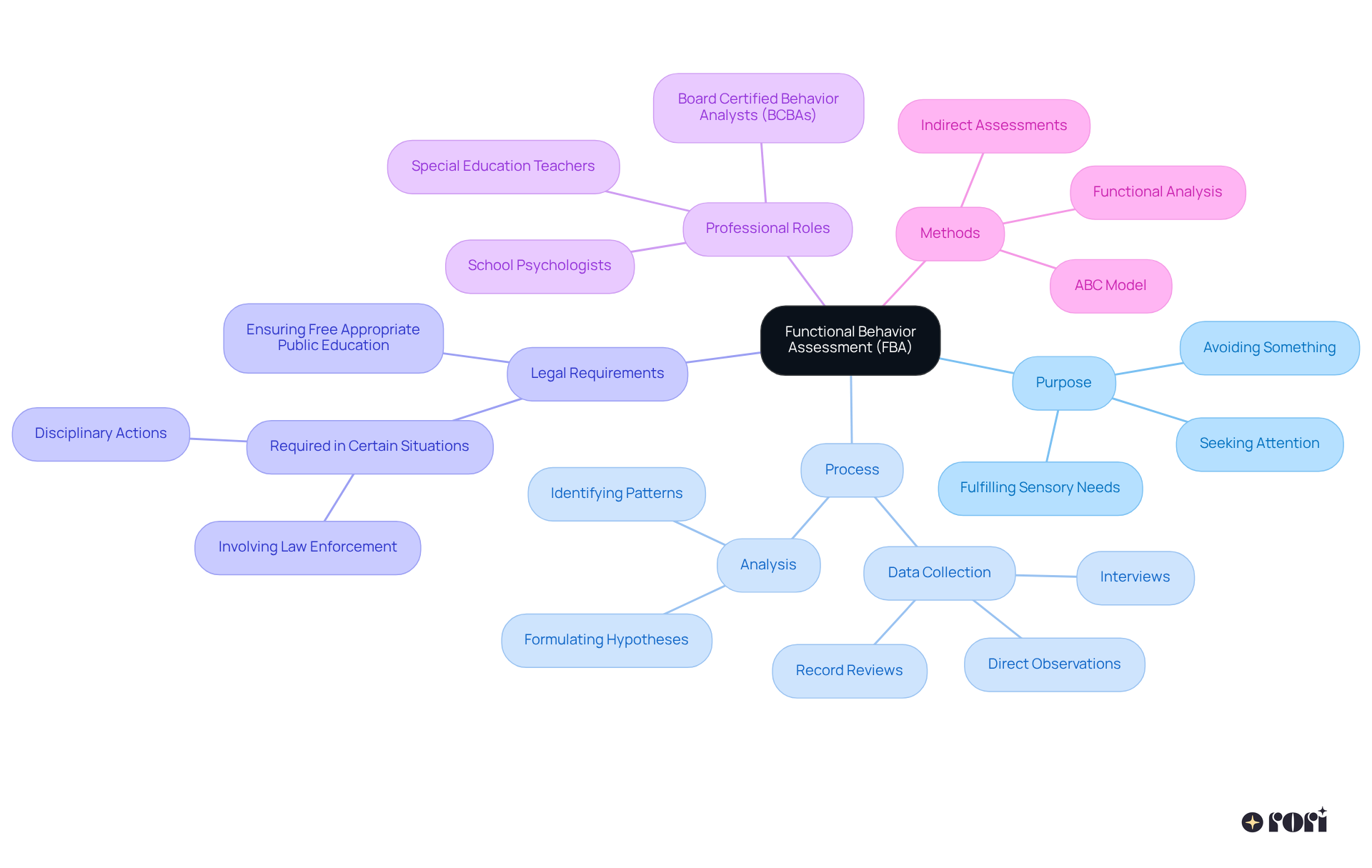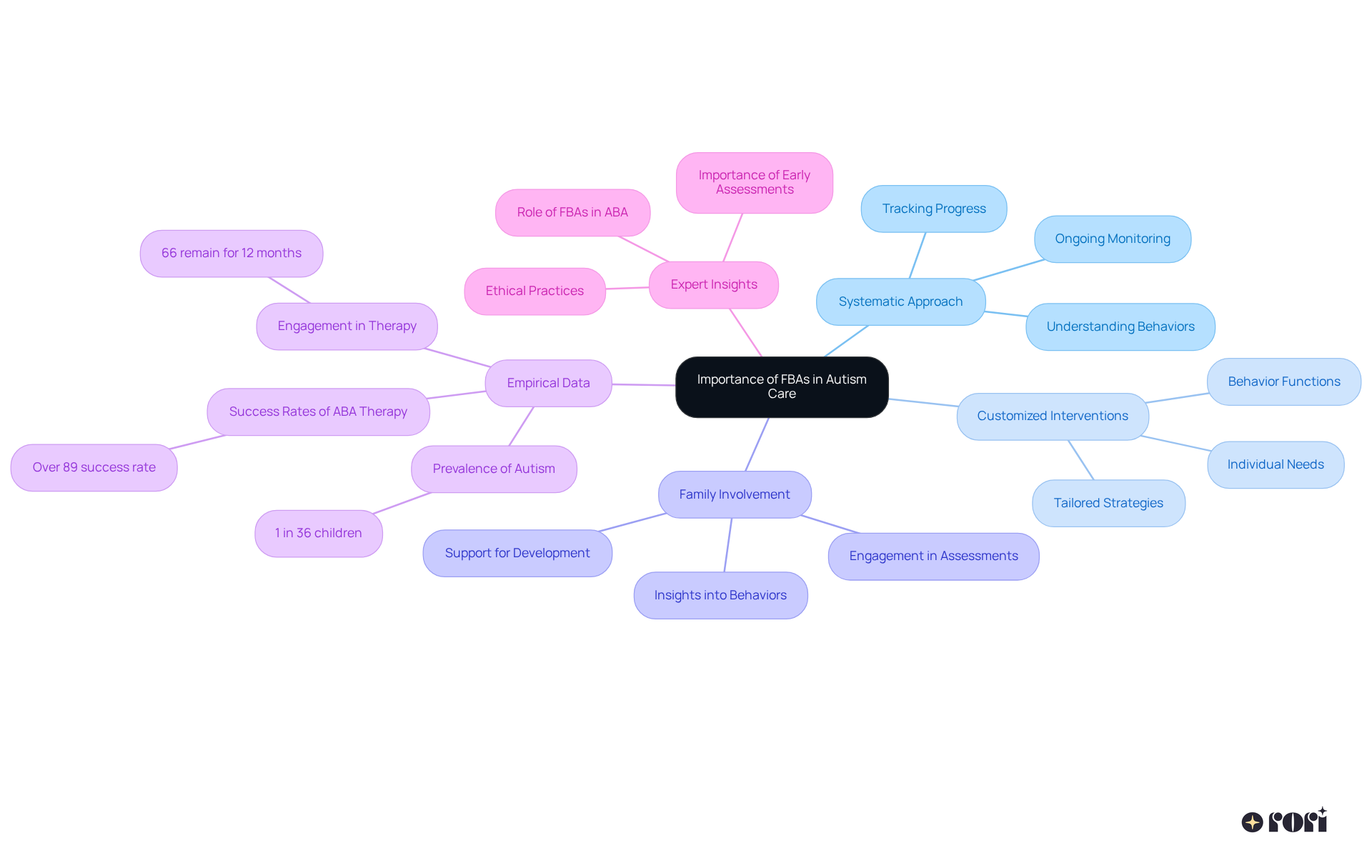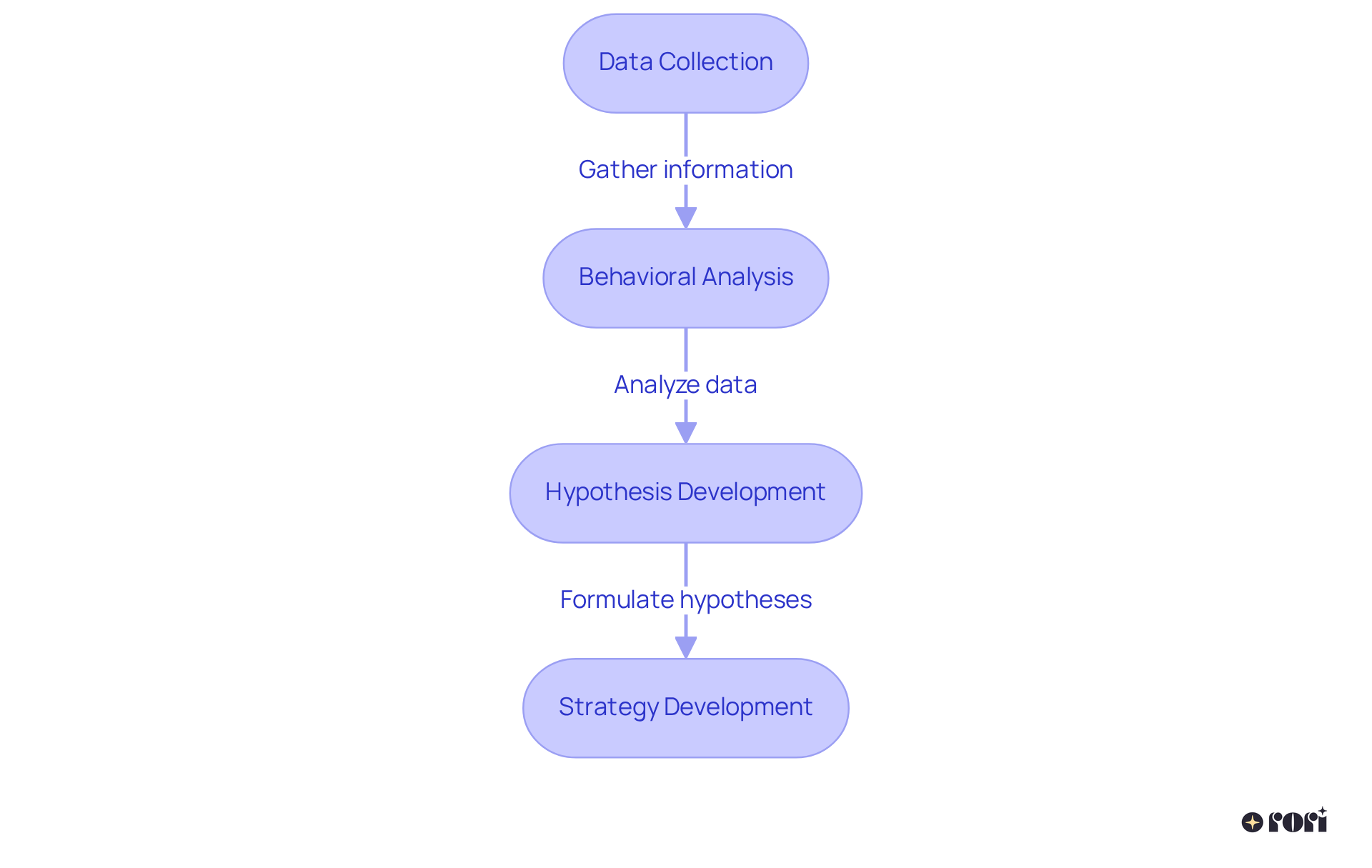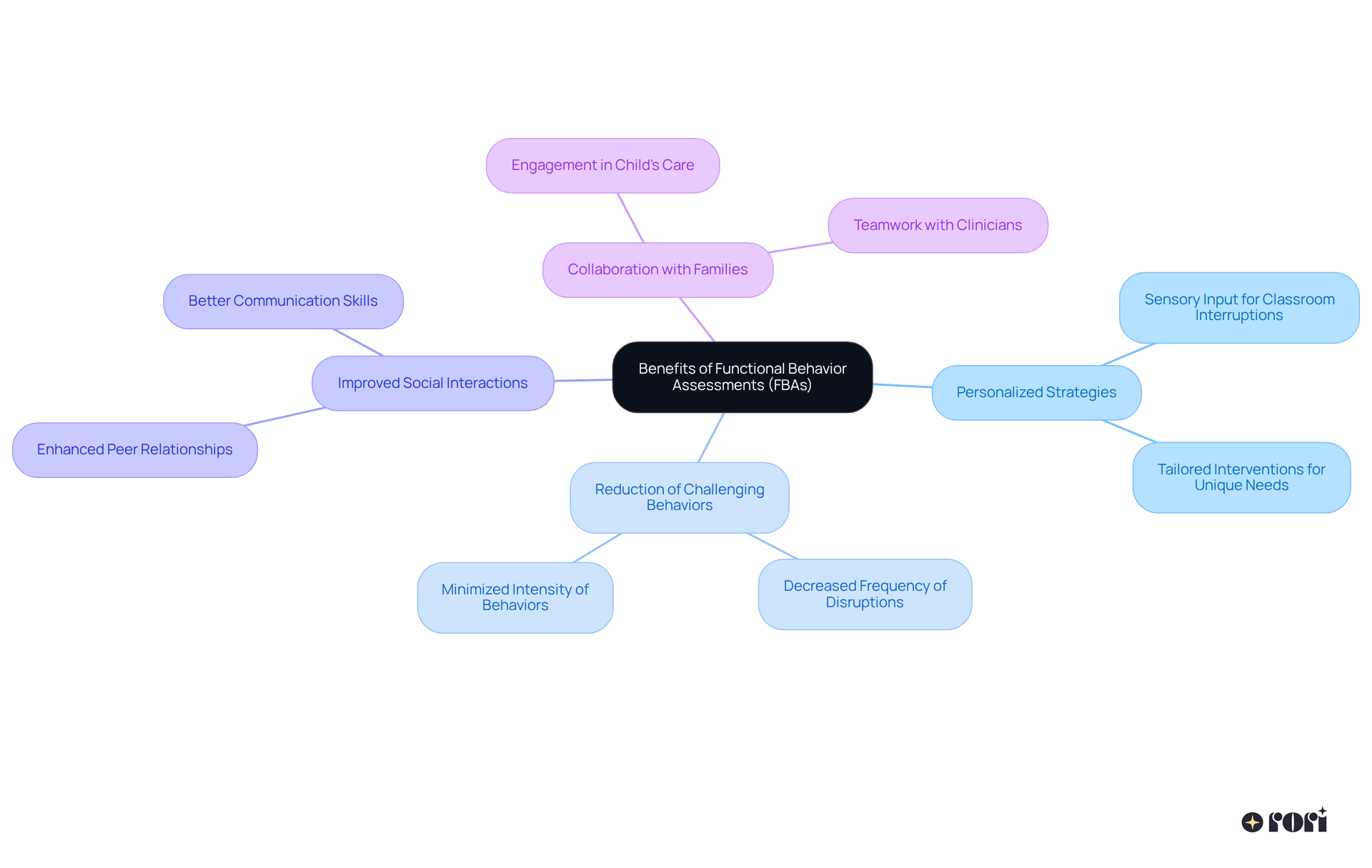The purpose of a Functional Behavior Assessment (FBA) in autism care is all about understanding the reasons behind challenging behaviors. By doing this, clinicians can create tailored intervention strategies that really promote positive changes. 😊
What’s great about FBAs is that they analyze data on behaviors and their contexts. This not only helps in crafting effective treatment plans but also brings families into the process. It’s a wonderful way to enhance the quality of life for children with autism, and we’re here to help you every step of the way! Let’s explore this together!
Understanding the complexities of autism care can feel overwhelming, but let's take a closer look at some tools that can help make meaningful progress.
One essential tool is the Functional Behavior Assessment (FBA). This systematic method is designed to uncover the reasons behind challenging behaviors in children with autism. By exploring the underlying motivations for these behaviors, clinicians can create tailored interventions that not only address immediate concerns but also promote long-term positive changes.
But what happens when these assessments reveal unexpected insights that challenge our preconceived notions about a child's behavior? Let’s explore this together!
A Functional Behavior Assessment (FBA) is a systematic way to uncover the reasons behind challenging behaviors in young people, particularly those with autism. This process involves gathering detailed information about specific actions, the situations around them, and the outcomes that follow. By carefully analyzing this data, clinicians can pinpoint the purpose of an FBA, which may involve seeking attention, avoiding something, or fulfilling a sensory need. Understanding this is crucial for crafting effective, personalized intervention strategies that cater to each child's unique needs.
Did you know that functional assessments are actually required by law in certain situations for students with disabilities? This is especially true when behaviors are linked to significant events. When done well, these assessments not only shape treatment plans but also empower families and educators to encourage positive behavioral changes, enhancing the child’s overall development and happiness.
Qualified professionals, like Board Certified Behavior Analysts (BCBAs) and school psychologists, carry out these assessments to ensure a trustworthy process. Plus, functional assessments can be proactive, helping to prevent future behavioral issues. Family involvement is key in fostering positive behaviors at home and in school.
During direct observations, the ABC model is often used to gather unbiased data about behaviors. Overall, implementing functional assessments effectively can lead to positive impacts on school participation and behavior, making them an essential part of autism support. Let’s explore this together and see how we can support your child’s journey!

The purpose of an FBA is to play a vital role in autism care by providing a systematic approach to understanding behaviors that can hinder learning and social interaction. By uncovering the root causes of these behaviors, clinicians can create targeted strategies that not only address the actions but also encourage positive alternatives. This is particularly important in applied behavior analysis (ABA), where data-driven methods are essential for tracking progress and evaluating effectiveness.
FBAs have shown remarkable impacts on autism treatment. For example, studies suggest that using functional behavior assessments right from the start of therapy leads to more effective behavior intervention plans, as they are based on actual behavior functions. This proactive approach ensures that treatment strategies are customized to meet each individual's unique needs, boosting the chances of successful outcomes.
Moreover, FBAs engage families by involving them in the assessment process. This partnership ensures that interventions are not only relevant but also practical in the young person's everyday life. Families gain valuable insights into their child's behaviors, fostering a deeper understanding and enabling them to support their child's development effectively.
Data underscores the effectiveness of functional behavior assessments in improving learning and social interactions for individuals with autism. Research indicates that children who undergo well-executed functional assessments show significant improvements in communication skills and adaptive abilities, leading to a better quality of life. Thus, functional assessments are not merely procedural steps; they form the foundation of effective autism care, facilitating meaningful changes in behavior and promoting ethical treatment practices.
Expert insights further validate the role of FBAs in crafting tailored strategies. By employing a thorough assessment process that includes defining behaviors, gathering baseline data, and testing hypotheses, practitioners can formulate personalized strategies that resonate with the individual's specific circumstances. This custom approach not only enhances the effectiveness of strategies but also aligns with the ultimate goal of fostering independence and social competence in individuals with autism.
According to the CDC, one in 36 (2.8%) of 8-year-old children have been identified with autism spectrum disorder, highlighting the critical need for effective interventions like functional behavioral assessments. As Rori Behavioral Innovations Inc. points out, "Functional assessments are a cornerstone of effective ABA therapy, providing a systematic approach to understanding why challenging behaviors occur." This highlights the importance of functional behavior assessments for the purpose of an FBA within the context of ABA therapy.
Additionally, ongoing observation and regular evaluation are crucial in ABA therapy to ensure that initial interventions remain effective, making sure that the strategies used continue to meet the individual's evolving needs. Furthermore, statistics reveal that 66% of youth referred for ABA therapy begin treatment and stay engaged for 12 months, underscoring the importance of FBAs in involving families and maintaining young individuals in effective treatment.

The purpose of an FBA process is to provide a vital tool for clinicians looking to understand and address challenging behaviors in children with autism. Let’s break it down into some key components that can really help!
First up is Data Collection. Clinicians start the FBA by gathering detailed information through direct observations, chatting with caregivers, and reviewing existing records. This multifaceted approach helps identify behavioral patterns and the contextual factors that influence a child's actions. Tools like ABC data collection templates and the Motivation Assessment Scale (MAS) can be used to make this data even more accurate.
Next, we have Behavioral Analysis. This step involves diving into the data to pinpoint the antecedents (or triggers), the specific actions, and the consequences (the reactions) tied to those challenging behaviors. Understanding this context is essential for grasping why certain actions occur.
Then comes Hypothesis Development. After analyzing the data, clinicians formulate hypotheses about the roles of the identified actions. This step is crucial for uncovering the underlying reasons behind the behaviors, like whether a child is seeking attention or trying to avoid tasks. Collaboration among analysts, educators, caregivers, and professionals is key here to ensure a comprehensive understanding of the child's needs.
Finally, we reach Strategy Development. Here, a tailored action plan is created, including strategies designed to address the recognized functions of the behavior. This plan isn’t set in stone; it’s continuously monitored and adjusted based on ongoing observations and feedback to ensure it works effectively. It’s also important to remember that conducting an FBA is a legal obligation when a student's behavior is linked to their disability, especially in disciplinary situations.
Overall, the purpose of an FBA is essential for crafting effective strategies that promote positive behavior changes, which ultimately enhances the quality of life for young individuals with autism. If you’re navigating this journey, remember—you’re not alone, and we’re here to help you every step of the way!

The advantages of conducting a Functional Behavior Assessment (FBA) are truly extensive! 🌟 Mainly, these assessments provide a deep insight into a young person's actions, helping to create tailored strategies that meet their unique needs. Research shows that functional behavior assessments can significantly reduce both the frequency and intensity of challenging behaviors. This, in turn, enhances social interactions and learning opportunities for our kids.
For example, consider a student who often interrupts classroom activities. Through an FBA, we might discover that they are seeking sensory input. This insight allows us to develop strategies that provide appropriate sensory experiences, effectively minimizing those disruptions. Plus, FBAs encourage collaboration between families and clinicians, allowing parents to actively engage in their child's care. According to Adams and White (2019), the success of long-term outcomes is often tied to how thorough the FBA process is, which highlights the importance of this teamwork.
Ultimately, the purpose of an FBA is to enhance a child's quality of life by fostering positive behaviors and promoting independence. Let’s explore this together and see how we can support our children in the best possible way!

Understanding the purpose of a Functional Behavior Assessment (FBA) is so important for effectively supporting individuals with autism. By taking a closer look at behaviors, clinicians can uncover the reasons behind challenging actions, which helps in creating tailored intervention strategies. This personalized approach not only addresses the behaviors themselves but also encourages positive changes that enhance the overall quality of life for children with autism.
Throughout this article, we’ve highlighted some key insights, including:
The FBA process includes:
All aimed at crafting effective, individualized treatment plans. Plus, research shows that well-executed FBAs lead to positive outcomes, like improved communication skills and greater engagement in learning environments.
In conclusion, embracing the FBA process is essential for anyone involved in autism care. It empowers families and enhances collaboration among professionals, ultimately leading to better outcomes for children. By prioritizing functional assessments, we can ensure that interventions are not only effective but also meaningful in the everyday lives of those we support. Engaging in this process is a vital step toward fostering independence and social competence in individuals with autism, paving the way for a brighter future. Let’s explore this together, and remember, we’re here to help you every step of the way!
What is a Functional Behavior Assessment (FBA)?
A Functional Behavior Assessment (FBA) is a systematic method used to identify the reasons behind challenging behaviors in young people, particularly those with autism. It involves gathering detailed information about specific behaviors, the contexts in which they occur, and the outcomes that follow.
Why is understanding the purpose of an FBA important?
Understanding the purpose of an FBA is crucial for developing effective, personalized intervention strategies tailored to each child's unique needs. It helps identify whether behaviors are aimed at seeking attention, avoiding situations, or fulfilling sensory needs.
Are functional assessments legally required?
Yes, functional assessments are required by law in certain situations for students with disabilities, especially when behaviors are linked to significant events. These assessments help shape treatment plans and support positive behavioral changes.
Who conducts Functional Behavior Assessments?
Qualified professionals, such as Board Certified Behavior Analysts (BCBAs) and school psychologists, conduct Functional Behavior Assessments to ensure a reliable and trustworthy process.
How can functional assessments be proactive?
Functional assessments can be proactive by helping to prevent future behavioral issues. They allow for early identification of potential challenges, enabling timely intervention.
What role do families play in the process of Functional Behavior Assessments?
Family involvement is key in fostering positive behaviors both at home and in school. Engaging families helps support the overall effectiveness of the assessment and intervention strategies.
What method is commonly used during direct observations in FBAs?
The ABC model is often used during direct observations to gather unbiased data about behaviors. This model focuses on the Antecedents, Behaviors, and Consequences associated with specific actions.
What are the overall benefits of implementing Functional Behavior Assessments?
Implementing Functional Behavior Assessments effectively can lead to positive impacts on school participation and behavior, making them an essential component of autism support.